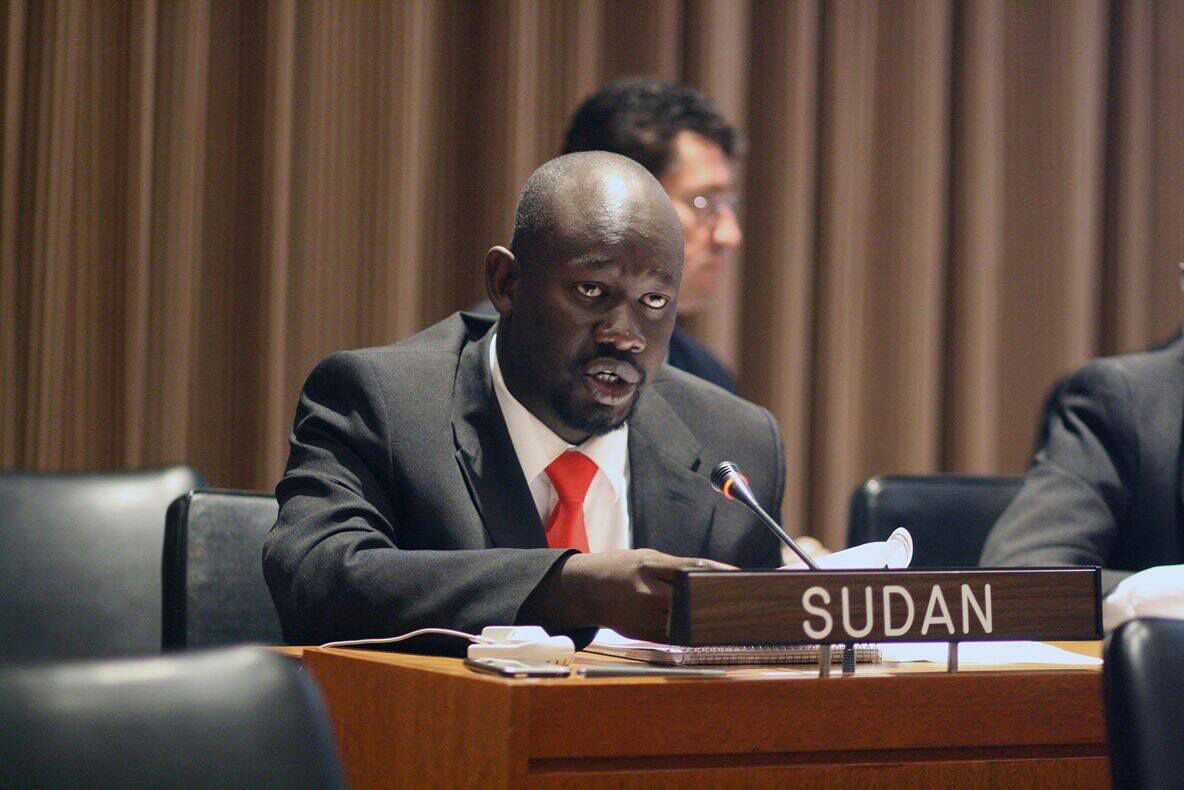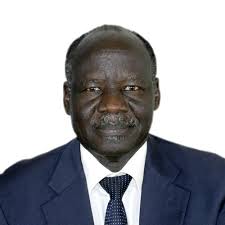
By; Ambassador: Emmanuel Aban Ajawin
On the 16th November, 2017 Cairo witnessed the signing of an agreement between two factions of the Sudan People’s Liberation Movement, in the government (SPLM- IG) and SPLM Former Detainees (FDs), which became known as the Cairo Declaration. This declaration, unlike previous declarations/agreements inked by the fractured SPLM factions in their quest for elusive unity, presents a significant strategic shift in Egypt’s approach towards issues of peace and security pertaining to the Republic of South Sudan and the region. The strategic shift is so not much in the geo- political position of Egypt within the region and its direct involvement with the SPLM factions, but rather it is based on Egypt’s propitious timing in light of the recent statement attributed to President Abdul Fattah El-Sissi on the 8th November, 2017 at a news conference in Sharm el-Sheikh. The President stated that ”We view positively the developmental needs of our friends and brothers in Ethiopia and we are capable of protecting our national security and water which to us is a question of national security.” The same sentiment was repeated on the 18th November after Egypt, Sudan and Ethiopia failed to approve a study on the potential effects of the Ethiopia GRED. In televised comment where he attended the inauguration of a fish farm in the Nile Delta province of Kafr el-Sheika, Egypt’s President stated that ”water is a matter of life or death and that no one can touch Egypt’s share of water.”
Considering these Presidential statements against the recently signed Cairo Declaration in the Headquarters of the Egyptian Intelligent Services (GIS- Mukhabarat) and witnessed by both the Egyptian chief of (Mukhabarat) and his Ugandan’s Counter-part, it is abundantly clear that the Horn of Africa and particularly South Sudan, will be witnessing a portentous future dominated by proxy wars. The Egyptians are sending an unequivocal diplomatic statement that they have decided, without any reservations, to support the government of South Sudan and its ruling party the SPLM, under the tyranny of President Kiir and his ethnocentric regime. The unification of the SPLM and preservation of the status quo as the ruling party in South Sudan, has become a matter of great importance for the Egyptian national security strategy. Instead of standing in solidarity with the victims and the oppressed people of South Sudan, Egypt has cast the dice on the wrong side of history. It has decided to align itself with a government that lacks legitimacy and which is responsible for the on-going infernal civil war, commissioning of heinous war crimes, crimes against humanity, displacement of millions and genocide.
The signed Cairo Declaration between the members of the Sudan People’s Liberation Movement, SPLM-IG and Former Detainees (FDs), and which was facilitated and supervised by H.E. Abdul Fattah El-Sissi the President of the Republic of Egypt and H.E. Yoweri Kaguta Museveni the President of the Republic of Uganda, unfortunately, is just a pie in the sky and will not achieve durable peace and stability in South Sudan. In fact, the political ills and quagmire that have befallen the nascent Republic rest squarely on the shoulders of the SPLM political and military elites. Since the independence of South Sudan, in July, 2011, the SPLM members who signed the Cairo Declaration are the same leaders who failed to articulate and provide a comprehensive political, social and economic road map that would have scientifically addressed the prodigious and convoluted issues of state and nation building. They became entangled in webs of corruption, embezzlement of public monies, and money laundering with absolute impunity. Millions of dollars that were received from the international donors and from the oil revenue ended up in the pockets of the SPL M political and military elites leaving the majority of the population destitute, hungry and poor. It is therefore, unfathomable and of poor judgment to think that salvaging South Sudan from imminent economic collapse, social break down and political disintegration, lies in the unification of various SPLM factions. Solutions to social, political, and economic ills in South Sudan are now beyond the confines of the SPLM political and military mafias.
The Arab Republic of Egypt in the distant past has played a positive and commendable role towards South Sudanese by providing academic scholarships to study in its various institutions of higher learning. Currently, Egypt is hosting large numbers of South Sudanese refugees despite the economic constrain the country is facing. South Sudanese will always be grateful for the hospitality and generosity Egypt has rendered. However, since the outbreak of the current civil war in 2013, Egypt has shifted its traditional approach towards South Sudan from humanitarian and educational spheres to political, diplomatic and military assistance of the oppressive regime in Juba. In December, 2016 it has played an instrumental role at the United Nations Security Council in opposing an arms embargo resolution on South Sudan, introduced by the United States of America. Militarily, South Sudanese opposition groups have allegedly accused Egypt of rendering logistical, technical and air support to the Sudan People’s Liberation Army (SPLA) in its brutal war against the people of South Sudan. Why is the Egyptian government spending its resources and tax payer’s money on a defunct and corrupt regime in Juba?
In answering the above question, it is imperative to note that Egypt’s foreign policy and security strategies towards South Sudan are heavily influenced by its strategy to ensure the uninterrupted flow of the Nile water which she entirely depends on for its existence as a nation. Hence Nile waters have become the most important element of its national security strategy towards the Horn of Africa and South Sudan. The notion that Nile waters could be shared amicably with the upstream countries, is an intolerable reality for Egypt as it perceives such actions to be against its survival and national interest. The first serious attempt by Cairo to implement its water policy vis- a-vis South Sudan was the commissioning of the Jonglei Canal Project. In the 1980s the governments of Sudan and Egypt embarked on an ambitious plan to build a canal that became known as Jonglei Canal Project. The purpose of the hydro-construction project in Upper Nile Province at the time was to ensure the flow of 4.7 billion cubic meters of water annually, to be shared equally between Egypt and Sudan. The problem with the Jonglei Canal was that the two governments didn’t consult the people of Southern Sudan extensively, and as a result it was unpopular, becoming one of the seminal reasons for the South Sudanese to take up arms against the regime of Jaafar Nimeiri in 1983. What is left of the project is the destroyed $50 million gigantic bucket-wheel excavator, an enormous piece of German engineering. Its destruction was a testimony to the people’s resistance against imposed projects that didn’t take their views and concerns into consideration.
In fact the striking correlation between the doomed Jonglei Canal Project and the Cairo Declaration is that both were made with political allies that are unpopular, corrupt, undemocratic and dictatorial. Egypt should have learned a valuable lesson from the Jonglei Canal that people and not governments should be its true strategic allies as far as South Sudan is concerned. Supporting the illegitimate and dictatorial government in Juba would have negative ramifications on the future relations between Egypt and the people of South Sudan. The Egyptian government should take a brotherly and catalytic role in bridging the prodigious political apogees between the various political groups in South Sudan, rather than supporting the unpopular SPLM regime.
The hosting of the SPLM reunification meetings in Cairo, and especially the involvement of its Intelligent Services (CIS-Mukhabarat) has created a perception, real or imaginary, that South Sudan could be used by Egypt in its proxy wars in the region, if diplomacy fails to resolve the current impasse on the Nile water negotiations. In the past, Egypt has never hesitated to use its military might against countries that it perceived to be threat to its national security pertaining to Nile waters. Egypt under the leadership of Khedive Ismail Pasha in 1875-76 invaded the northern region of Ethiopia with the objective of controlling the source of the Blue Nile (Abay). Emperor Yohannes IV defeated the invading Egyptian forces at Gundet and Gura respectively.
Although, the battles of Gundet and Gura were the last physical confrontations between Egypt and Ethiopia, relations between the two countries for more than one hundred years have been characterized by deep suspicion, paranoia, diplomatic and proxy wars. The Egyptian political gamble of supporting SPLM factions, will compel other countries in the region to search for allies within and outside South Sudan. This will undoubtedly compound the already complicated situation in South Sudan. The battle ground for the region’s water wars would be fought in South Sudan with dire consequences on human lives and properties. South Sudan could slip into a perpetual state of war for many decades to come. In the long term, these wars could lead to the collapse of South Sudan as a state, with its becoming a breeding ground for terrorist organizations including ISIS and Al-Qaeda affiliates. Given the strategic geographical location of South Sudan, the regionalization of conflict within its borders will pose a serious threat to the international peace and security. Therefore, it is prudent and incumbent upon the international community, AU, UN and Troika to exert pressure on both Egypt and Uganda to leave the people of South Sudan to resolve their political, social and economic crisis without interference, or the presence of various political forces in the country to fight their proxy wars. Enough is enough! The international community should put an end to unwarranted interventions by some of the regional countries into the affairs of South Sudan. The African Union (AU) and the United Nations should consider punitive actions against countries that are prolonging and profiting from the war in South Sudan, otherwise if these unwarranted state of affairs are left to continue unchallenged, the envisaged IGAD High Level Revitalization Forum (HLRF) may end up dead before it even commences.
Ambassador; Emmanuel Aban is Spokesman for The:
National Democratic Movement (NDM), and can be reached at Email: ojwokj@hotmail.com
Editor’s Note: The views expressed in the “Opinion Page” are solely the opinions of the writers. The veracity of any claims made are the responsibility of the author’s and are not necessarily endorsed by The Malakal Post. The Malakal Post, reserves the right to edit articles before publication. If you would like to submit an opinion article or analysis, please email your article at: info@malakalpost.com















